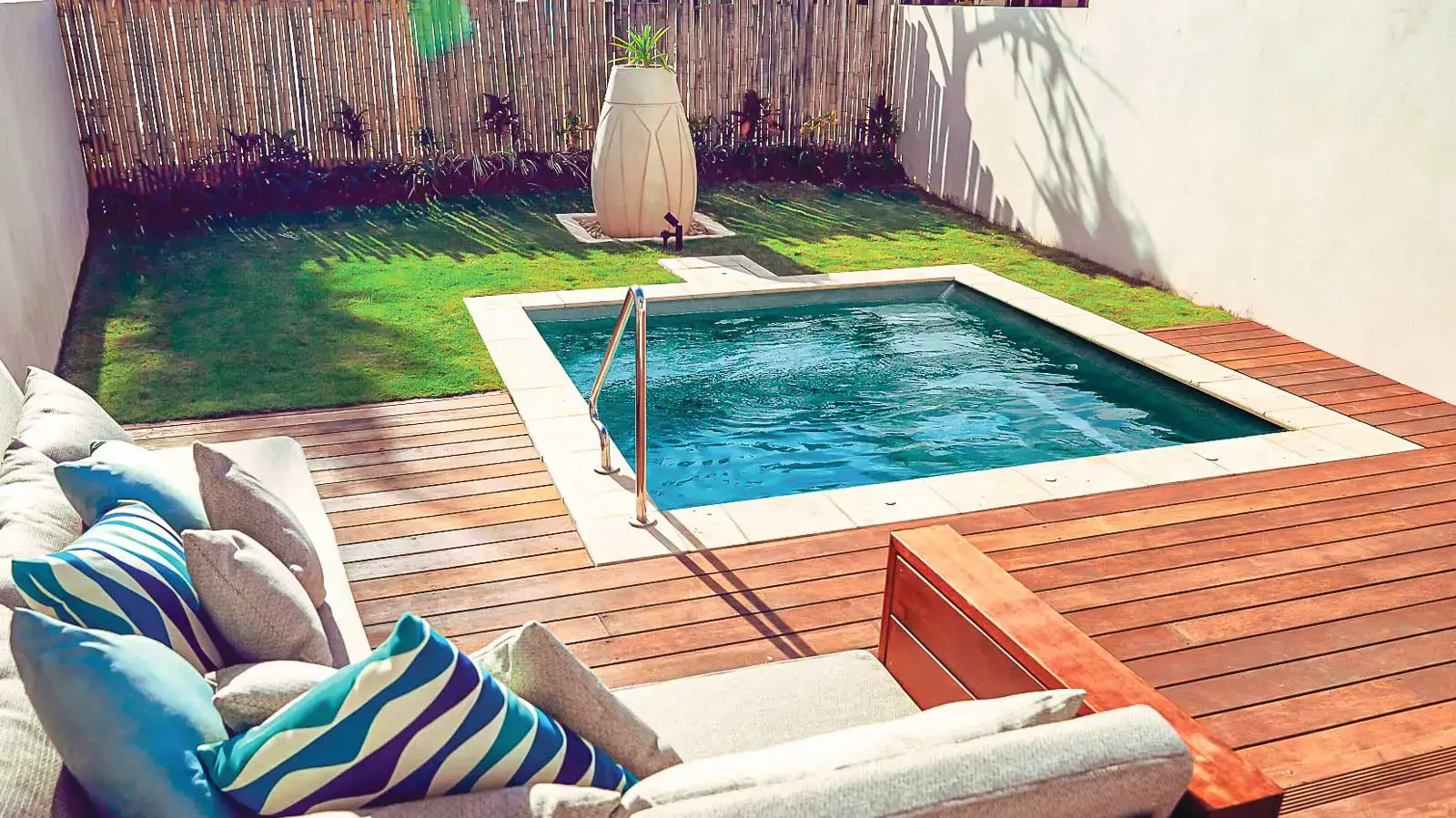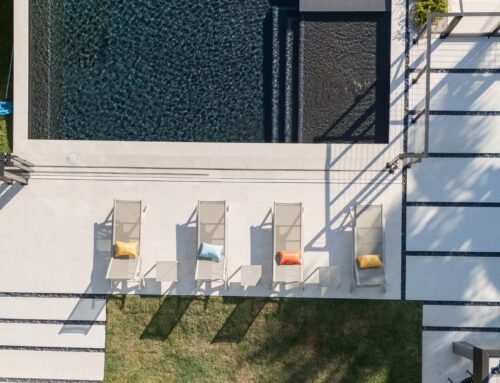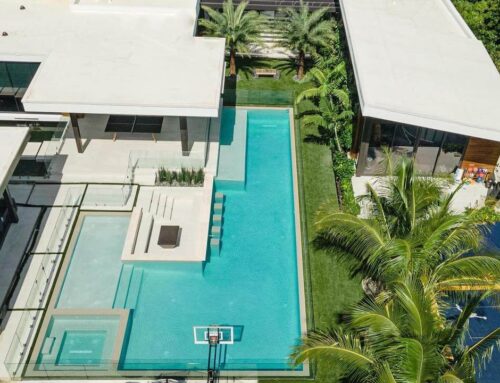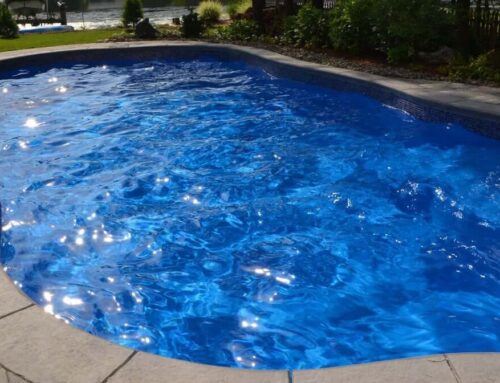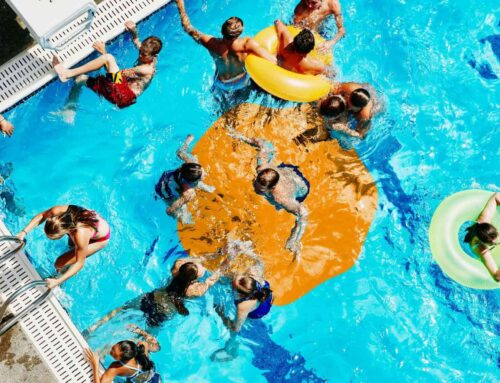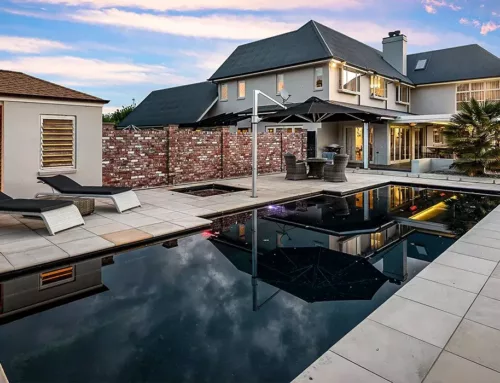Do you doubt the feasibility of having a pool in a limited space? The cost of a plunge pool typically falls within the range of $10,000 to $50,000, with an average expenditure for most homeowners around $20,000.
- Range Typical: $10,001 to $50,000
- Average National Value: $20,000
Many individuals have a dream of owning a swimming pool, but what if there isn’t enough space to install one? For those with small yards, a plunge pool provides an excellent solution for cooling off during the hot summer months. In terms of pricing, inground swimming pools tend to be less expensive on average, whereas above-ground pools are generally pricier. Plunge pools, also referred to as cocktail pools, offer a modest depth that allows for refreshing dips and low-impact exercises.
The cost of a standard-size fiberglass inground pool can be prohibitive for many homeowners, who may also be conscious of water conservation. Plunge pools come in various options, including above-ground, semi-inground, and in-ground models, typically ranging from 5 1/2 to 7 feet in depth.
According to HomeAdvisor and Angi, the average cost of a plunge pool is $20,000. A smaller plunge pool, measuring around 6 feet in width, may cost between $10,000 and $15,000, while a larger pool spanning 10 to 12 feet can range from $20,000 to $300,000, depending on size, shape, and material. Keep in mind that incorporating additional features like lighting, heating, or a spa will raise the overall cost of the plunge pool. We will explore the factors involved in calculating the cost of a plunge pool, as well as the supplementary elements that may contribute to its price.
Factors in Calculating Plunge Pool Cost
What is the price of a plunge pool? This question hinges on several factors. The cost can deviate from the national average based on variables such as the pool’s size, shape, type, location, labor costs, permit fees, excavation and site preparation expenses, and the geographic area in which it is being installed.
Size and Shape of the Pool
The cost of a small plunge pool is typically lower compared to a larger one. A pool with a diameter of 6 feet can be acquired for a price ranging from $10,000 to $15,000, whereas a larger option measuring 10 to 12 feet in diameter costs anywhere between $20,000 and $30,000. The shape of a small pool also influences its cost. A rectangular or square pool tends to be less expensive than an L-shaped, custom-shaped, or round plunge pool.
Pool Type
Both above-ground and inground plunge pools are available options. The cost of an above-ground plunge pool can start as low as $3,000 but can reach up to $30,000, depending on its size and customization. On the other hand, inground plunge pool prices typically range from $10,000 to $35,000. The final price is influenced by factors such as the shape, size, and material chosen for the pool.
Pool Materials
Pricing is significantly impacted by the choice of pool material. Concrete plunge pools generally carry a higher price tag, while vinyl and fiberglass options tend to be more affordable. It’s important to note that the cost of labor is also influenced by the selected material.
Pool Location
The expenses associated with site preparation and installation may increase if the pool is situated in a location that is challenging to access for excavation equipment.
Labor
Labor costs for plunge pools can vary between $1,000 and $6,000, contingent upon the chosen material. It’s important to note that this price does not encompass landscaping or additional features. Vinyl and fiberglass plunge pools are generally easier to install compared to concrete ones, which often results in lower labor costs. By providing pool professionals with information regarding the pool’s size and material, they can provide a reasonably accurate estimate of the labor expenses involved.
Permits
The expenses associated with building permits can fluctuate based on the geographical location. For an inground pool, the cost of a permit can range from $400 to over $1,800, depending on the specific area. It’s worth noting that an above-ground plunge pool generally does not require a building permit, but it is always advisable to verify the local regulations to ensure compliance.
Excavation and Site Preparation
Proper site preparation is essential for installing a plunge pool, involving tasks such as ground leveling, and removal of rocks, trees, stumps, and any other obstructions. Typically, site preparation fees and excavation costs fall within the range of $1,500 to $5,000. However, these costs can increase for challenging areas or deeper pools. Some reputable pool installation companies incorporate site preparation and excavation fees into their price estimates, while others may charge an additional fee. It’s important to note that excavation costs tend to be higher for custom-designed pools featuring elements like infinity edges or unique plunge pool designs.
Geographic Location
Geographic location affects permit fees and labor costs. Permits and labor costs are often higher in urban areas with dense populations than in rural locations.
Additional Costs and Considerations
You must consider any extra costs or factors which may affect the price of your plunge pool. This can include temperature control and customizations as well as property taxes and maintenance costs.
Temperature Control
It is usually more cost-effective for a plunge pool to be heated than a pool of standard size. A pool heater can cost between $1,600 to $3,600.
Customizations
Many homeowners customize their plunge pools with specific features such as lighting, water elements, pool covers, and more. Here are the most popular pool add-ons, and their average price.
- Tile: Basic tile options typically range from $4 to $32 per square foot, while mosaic or glass tiles can cost up to $100 per square foot.
- Spa System: Enhance your plunge pool with a spa system, providing a tranquil oasis. The price of a spa system can vary from $3,500 up to $15,000, depending on its quality.
- Water Features: Additional features like deck jets and bubblers can cost between $800 and $1,200.
- Pool Cover: A basic pool cover can be as low as $100. However, solar, retractable, or automatic covers can reach up to $2,400 in price.
- Lights: Illuminating the pool area and interior during nighttime enhances the overall experience and visibility. LED pool lights range in price from $800 up to $1,200 per light.
- Ladder: Prices for ladders vary from $65 up to $400, depending on the type of pool.
- Steps: Fiberglass or vinyl steps can be installed in both above-ground and below-ground plunge pools, with costs ranging from $90 to $700.
- Underwater Treadmill or Bicycle: An underwater treadmill costs around $1,300, while an underwater bike starts at $275.
- Swim Jets: If you desire the ability to swim laps within a limited pool space, swim jets, also known as static swim systems, provide a solution. Swim jets can cost as little as $2,000, depending on brand, horsepower, and additional features.
- Automated Control System: A smartphone-controlled automated control system for pool features typically costs between $1,500 and $2,600.
- Conversion to Saltwater: Converting a chlorinated swimming pool to a saltwater system can range from $500 up to $2,000.
- Pumps and Filters with Variable Speed: Variable-speed pumps and filters can help save on energy bills. These pumps range in price from $270 up to $1,200.
- Infinity Pool Upgrade: Installing an infinity edge can cost anywhere from $25,000 to $50,000. Infinity edges require specialized installation and incur additional labor costs.
Property Taxes
Installing a pool can be considered an upgrade and increase your property taxes. The state and local tax laws will determine how much property taxes increase.
Maintenance
The maintenance costs associated with plunge pools are generally lower compared to those of standard pools. On average, pool maintenance costs range from $110 to $349. The typical expenditure for homeowners is around $229 per pool cleaning service. Smaller pools result in reduced maintenance costs and lower utility expenses.
Types of Plunge Pools
The material of the plunge pool is what makes the biggest price difference. Concrete, vinyl, and fiberglass are the three main types of plunge pools.
Concrete
Concrete is often the most expensive material for plunge pools. Prices for concrete plunge pools can vary from $20,000 up to $35,000 or even higher, depending on the extent of customizations. Concrete provides homeowners with greater design flexibility, allowing for the creation of custom-shaped pools, unlike fiberglass or vinyl options. Additionally, concrete is known for its durability and water resistance, eliminating concerns about the potential tearing or ripping of vinyl pool liners.
Vinyl
Vinyl plunge pools are usually the least expensive. A vinyl plunge pool costs between $10,000 and $18,000. Although a vinyl pool is less expensive, it might not last as much. Vinyl liners need to be changed every 5 to 9 years.
Fiberglass
The cost of a fiberglass plunge pool typically falls between $10,000 and over $22,000. Fiberglass pools offer a convenient option for homeowners who prefer a pre-made design rather than a custom-shaped pool. These pools are known for their ease of installation and maintenance. The price of prefabricated fiberglass plunge pools may vary based on factors such as size and additional custom features.
Above-Ground
Custom-designed pools often come with a higher price tag. Above-ground plunge pools are available at prices ranging from $3,000 up to $30,000. Opting for an above-ground pool can be a cost-saving choice for homeowners as it eliminates the need for excavation expenses and typically does not require a permit.
Inground
The cost of an inground pool can vary from $10,000 to $35,000, depending on factors such as pool size, type, and any desired custom features. Inground concrete plunge pools generally have higher costs, while vinyl and fiberglass options tend to be more affordable.
The Benefits of Installing Plunge Pool
Plunge pools offer several advantages over regular-sized pools. They are easier to maintain, install, cover, and clean. Additionally, plunge pools tend to be more cost-effective when it comes to heating expenses. Homeowners also have the flexibility to customize plunge pools in ways that may not be possible with standard pools.
Relaxation and Exercise
The size of a plunge pool offers the perfect opportunity to maximize the benefits of an underwater treadmill or bicycle. Pool workouts are particularly beneficial for individuals with joint problems, as they provide low-impact resistance and exercise. Additionally, on hot and humid days, taking a refreshing dip in the water is an excellent way to relax and unwind.
Increased Home Value
Installing a plunge pool can enhance the value of a house and make it more appealing to potential buyers seeking a property with a pool. The ease of maintenance and cleaning associated with plunge pools adds to their attractiveness to buyers.
Plunge Pool Installation: DIY vs. Hiring Professionals
Although it may pose challenges for homeowners with limited DIY experience, above-ground plunge pools are often the preferable choice. It’s important to keep in mind that pool design or basin expenses can reach up to $4,000, and building permits can range from $400 to $1,800, depending on the location and local regulations. The installation cost will be influenced by factors such as excavation, materials, and any additional features.
For inground plunge pools, it is highly recommended to hire a professional pool installer. Mistakes during installation can result in additional expenses for repairs or replacements. Utilizing a professional installer, regardless of the type or size of the plunge pool, typically ensures professional installation and comprehensive warranties.
Save Money on Plunge Pool Costs
It can be hard to budget for the installation of a plunge pool because the costs associated with this project can add up quickly. Installing the cheapest plunge pools is one way to save, but you can also save by installing the plunge pool that has the most features.
- Request Multiple Quotes: It is advisable to obtain at least three quotes from professionals specializing in plunge pools.
- Be Prepared: By ordering the pool and scheduling its installation well in advance, you can avoid the price hikes that pool companies often impose during the hot summer months, thereby saving money.
- Avoid Unnecessary Add-Ons: While water features, color-changing lighting, and expensive tiles may enhance the pool’s aesthetics, they can significantly increase the overall cost. Consider whether these additions are essential to your needs and budget.
- Consider Vinyl: Vinyl liners typically require replacement every 10 years, but the initial installation costs of a vinyl pool are considerably lower than those of concrete pools.
- Delay Landscaping Decisions: Take your time to assess how the pool integrates with its surroundings before making decisions on patio, deck, or landscaping features. This will allow you to make better-informed choices that complement the pool and the surrounding area.
- Maintain the Pool Yourself: While hiring a professional to maintain your pool may save you time, it can also save you money. Consider taking on the pool maintenance tasks yourself to reduce expenses.
Contact Florida Pool Patio Today for a FREE Estimate
Looking to transform your outdoor space with a stunning plunge pool? At Florida Pool Patio, we understand that cost is an important factor in your decision-making process. Wondering about the price of a plunge pool? Our team of experts is here to provide you with the information you need. From the size and design to the materials and features, various factors can influence the cost. Reach out to us today and let our knowledgeable professionals guide you through the process of estimating the investment required for your dream plunge pool.
Contact Florida Pool Patio and turn your backyard into a refreshing oasis.
Services We Offer:

